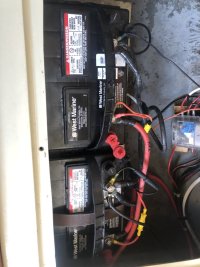I’d like to replay my recent experience to get your advice on what might be wrong with my batteries or charger. Starting my engine has never presented a problem.
Two weeks ago, I started the engine as always, went sailing, motored into the slip. Last week I went to fire up the engine and was not able to crank the engine on. The batteries seemed to give an effort but not enough juice to bring the engine to life. I always turn off the shore power before I start the engine. Used my voltmeter and essentially got nothing, as in the number 1 flickered on and off.
But, with the shore power on and the charger on, the engine cranked on with some effort. It took enough cranks that I closed my raw water until it fired up.
Two days later I went back to puzzle over it some more. This time the voltmeter read 19 volts before I tried anything! Each battery separately started the engine no problem with the charger and shore power off.
I checked water levels. My batteries always need a little water every 5-6 weeks. They were not low this time but below full. So, I added water. After about 30 minutes used the hydrometer. On both batteries I got essentially the same readings. First cell in each bank was fair and the 2nd and 3rd cells were high and sometimes off the charts high.
I always have a little water in the battery box, very little, but it’s reactive to a spritz of water with baking soda. I’ve always wondered about this.
Batteries are over 5 years old.
Any thoughts on what might be going on or how to further diagnose? Is it a charger issue?
Thanks for any advice.
Two weeks ago, I started the engine as always, went sailing, motored into the slip. Last week I went to fire up the engine and was not able to crank the engine on. The batteries seemed to give an effort but not enough juice to bring the engine to life. I always turn off the shore power before I start the engine. Used my voltmeter and essentially got nothing, as in the number 1 flickered on and off.
But, with the shore power on and the charger on, the engine cranked on with some effort. It took enough cranks that I closed my raw water until it fired up.
Two days later I went back to puzzle over it some more. This time the voltmeter read 19 volts before I tried anything! Each battery separately started the engine no problem with the charger and shore power off.
I checked water levels. My batteries always need a little water every 5-6 weeks. They were not low this time but below full. So, I added water. After about 30 minutes used the hydrometer. On both batteries I got essentially the same readings. First cell in each bank was fair and the 2nd and 3rd cells were high and sometimes off the charts high.
I always have a little water in the battery box, very little, but it’s reactive to a spritz of water with baking soda. I’ve always wondered about this.
Batteries are over 5 years old.
Any thoughts on what might be going on or how to further diagnose? Is it a charger issue?
Thanks for any advice.


